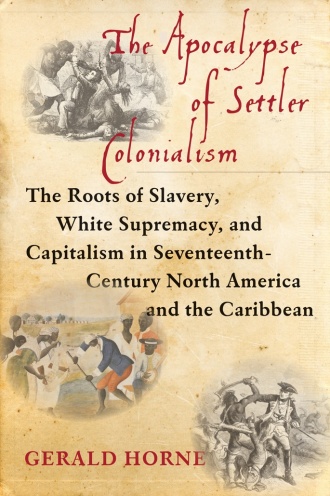This is the last article you can read this month
You can read more article this month
You can read more articles this month
Sorry your limit is up for this month
Reset on:
Please help support the Morning Star by subscribing here
The Apocalypse Of Settler Colonialism: The Roots of Slavery, White Supremacy and Capitalism in Seventeenth Century North America and the Caribbean
by Gerald Horne
(Monthly Review Press, £18.99)
THE EIGHTEENTH century was the slavers’ century. At least six million Africans were kidnapped and shipped to the Americas — with far more killed resisting capture — making the trade in enslaved Africans the most valuable in the world.

Yet it was the tumult of the 1600s that put the pieces in place for what was to come and in this fascinating new book Gerald Horne shows just how pivotal that century was for the trade itself, as well as capitalism and white supremacy, its economic and ideological corollaries.
In 1600, “blackness” had not yet become the immutable marker of eternal slavehood it was to become by the century’s end. This was why, for example, the African given the name Anthony Johnson, who arrived in Maryland as a slave in 1621, was able to accumulate a 40-acre tract of land by the end of his life, paving the way for two of his children to acquire 800 acres in Northampton County. By 1700, such a feat would have been rendered legally and socially impossible.
Yet, as late as 1646, an order in Massachusetts was to castigate “the sinn of man stealing” as a “vile and odious” practice and demand that the enslaved appellant be “sent home” to Guinea forthwith along with a “letter with him of indignation.” In hindsight, such sentiments appear to be a last gasp of humanity emanating from a social and economic order which could no longer brook such mercy.
The key turning point, argues Horne, was the so-called Glorious Revolution of 1688. While the need for captive labour grew and grew, especially following England’s seizure of Jamaica from Spain in 1655, so too did merchant anger at the Crown’s stubborn monopoly of the trade in enslaved Africans.
Flying in the face of the hallowed freedom of trade fast being elevated to the status of a divine principle, they argued that this monopoly was not only denying them a piece of the pie but also denuding Britain’s colonies of its labour force and thereby risking jobs in all those industries in the mother country dependent on slave-grown materials.
Thus one of the “revolutionary” demands of the Glorious Revolution in London was the deregulation of this hateful commerce and the entrance into it of private traders — a “blatant power and money grab by merchants,” says Horne, “which was then dressed in the finery of liberty and freedom.”
That the “freedom” at stake was in fact the freedom to enslave is, of course, rarely mentioned in school, or even university, histories of this particular episode of the rise of British liberalism.
Yet the massive increase in enslavement that followed the 1688 deregulation, and the consequent entrenchment of white supremacy and racial oppression in response to the resistance it provoked, is what ultimately paved the way for the 18th century decimation of the African population from which that continent is still reeling. “If one is searching for a year that marks the onset of the dawning of the apocalypse,” says Horne, “1688 is the date.”
Horne’s work is a fascinating insight into all these processes. His extensive use of contemporary primary sources successfully gets across both the fragility and the contingency of the developments he describes, while his unabashed partisanship on the side of the oppressed is refreshing.
Highly recommended.










